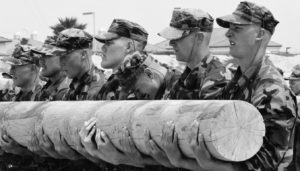
But Navy special forces operatives aren’t called to go behind enemy lines to carry logs. Their training is a test for the capacity to persevere. While there are many strapping young men with the ability to do what SEALS do, there are few with the will to hang on. This has been identified as a critical feature of the elite group.
Is SEAL training like doctor training?
While physicians can’t be compared to the Special Forces, there are features necessary for success including the will to persist. Undergraduate and graduate medical training can be mentally and physically trying. If you’re not focused and determined to make the end point you’ll never get there.
Some of the hoops of medical training provide such tests. From my earliest premedical courses through to the end of my fellowship there were so many points where I watched people put their hands up and ring the bell. They had the capacity but lacked the will. Organic chemistry was one of those points.
For many, organic chemistry is the hell week of premedical training. The core elements of organic chemistry approximate worthless when it comes to what a doctor needs to know. But in my sphere it played a perverse role in helping to identify those without the capacity to persevere. Those who rang the bell over cis-isomers would have done it later when the challenges were greater.
Training challenges as a test of perseverance
There are plenty of bright, talented and compassionate individuals who ‘would have made great doctors.’ If only they could have got there. But getting there in a strange way is part of knowing who has the capacity to stay there.
Certainly medicine needs better tools to assess the will and skill sets of its candidates. Until then there are points along the way that have no relevance to the day-to-day work of being a doctor that do a wonderful job of weeding out those who think being a doctor would be a lot of fun.
It sounds primitive. But so does carrying logs.